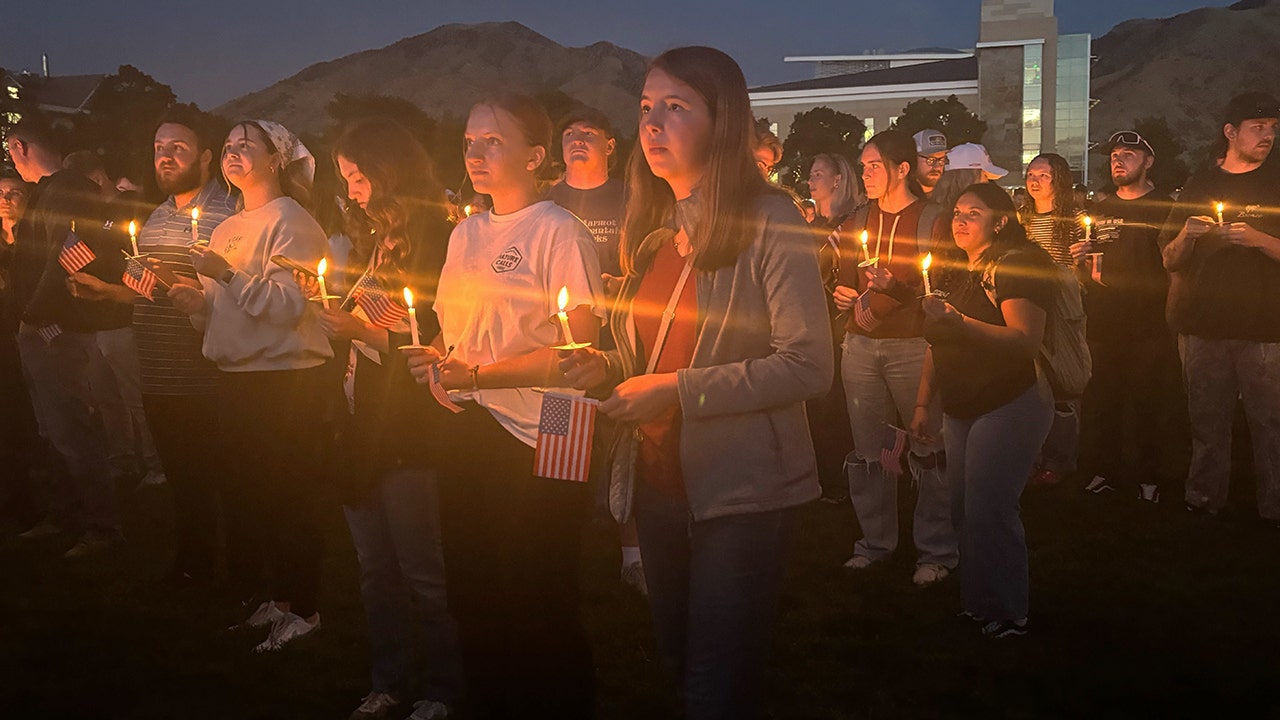A powerful scene unfolded at the University of Texas at San Antonio this week as thousands of students gathered for a vigil honoring Charlie Kirk, the conservative activist whose assassination shocked the nation.
The event, filled with candles, prayer, and song, culminated in a thunderous chant of “Christ is King!” that echoed across campus, symbolizing both grief and a renewed embrace of faith among young people who say they have been profoundly changed by the tragedy.
Organizers described the vigil as a student-led movement that drew participants not only from the UTSA community but also from surrounding colleges and churches.
Attendees stood shoulder to shoulder on the campus lawn, many clutching signs with Bible verses, others simply holding hands as tears streamed down their faces. For many, it was a moment of public mourning; for others, it was a declaration of their rediscovered faith.
As the sun set, the vigil began with soft hymns played by a group of students strumming guitars. Volunteers handed out candles, which quickly turned the gathering into a sea of flickering light.
Some students read passages from Scripture, while others offered personal reflections on how Kirk’s life and death had touched them.
The most striking moment came near the end, when thousands of voices joined together in chanting “Christ is King!” The chant grew louder, rising in unison until it reverberated across the campus grounds.
Witnesses described it as both chilling and uplifting, a moment when grief turned into collective strength.

“Charlie would be absolutely floored if he could see this,” one student said afterward. “So many people came to God this week because of him. It’s heartbreaking that it took his death, but his legacy is bringing people back to faith.”
Charlie Kirk, founder of Turning Point USA, had long been a prominent voice in conservative politics, championing free speech, religious liberty, and traditional values.
His sudden death has left a gaping void for his supporters, particularly among college students who admired his courage in challenging cultural and political norms.
At UTSA, Kirk’s impact had been felt for years through the presence of Turning Point USA chapters, which regularly hosted events and debates.
Several students who spoke at the vigil recalled moments when Kirk visited campuses, urging young people to hold fast to their beliefs even when unpopular.
“Charlie gave us the confidence to be open about our faith,” said a senior who addressed the crowd. “He told us not to be afraid of being mocked or marginalized. Tonight, we honored that message.”
In the days since Kirk’s assassination, student groups across the country have reported a surge of interest in prayer meetings, Bible studies, and campus church services. Many young people who had drifted away from religion have reportedly returned, citing the tragedy as a turning point.
At UTSA, campus ministers said they were overwhelmed by the number of students seeking counsel. “We have seen an awakening,” one chaplain explained.

“Students who hadn’t set foot in church in years came forward this week, saying they wanted to know Christ. It’s unlike anything I’ve seen before.”
For many at the vigil, the chants of “Christ is King!” were not simply a tribute to Kirk but an affirmation of their renewed spiritual identity.
While the vigil was deeply spiritual in tone, it also carried political undertones. Kirk’s death has been portrayed by conservatives as a symbol of escalating violence against their movement, and some speakers at the event framed his assassination as evidence of cultural hostility toward Christianity and conservatism.
Still, organizers were careful to keep the focus on faith rather than partisanship. “Tonight is about Charlie’s legacy and about God’s glory,” one student leader said. “Politics has its place, but this vigil is about something higher.”
The message resonated with attendees, many of whom described the event as a rare moment of unity in a polarized time. Even those who admitted they did not share Kirk’s political views said they came to honor his life and the outpouring of faith it inspired.
Stories poured out from the crowd as students and faculty took turns at the microphone. One young woman spoke about how she had been struggling with depression and doubt but found new strength through prayer after hearing about Kirk’s death.
Another student recounted how he had been distant from his family but was moved to reconnect with them after attending a campus Bible study earlier in the week.
Parents also joined the gathering, some traveling long distances to be present. One father held his teenage son’s hand tightly as he explained that Kirk’s life was a model of courage. “He wasn’t afraid to speak truth, and now my son isn’t either,” he said with tears in his eyes.

For many, the vigil was not just a memorial but a call to action—to live boldly, to defend their faith, and to honor Kirk’s memory by embracing God more fully.
Images and videos of the UTSA vigil quickly spread on social media, with clips of thousands chanting “Christ is King!” going viral. Supporters hailed it as proof that America’s youth are not lost to secularism, but are instead ready for revival.
Prominent conservative figures praised the students for their courage and faith. “This is what Charlie stood for,” one commentator wrote. “He planted seeds that are now bearing fruit.” Others suggested that the vigil represented a larger cultural shift, a potential turning point for faith in public life.
Critics, however, questioned whether the event blurred the line between religion and politics. Some argued that the vigil risked turning a tragedy into a partisan rally. But for those present, the evening was defined by reverence, not division.
As the vigil drew to a close, organizers urged students to carry the spirit of the night forward. They encouraged attendees to join prayer groups, attend church services, and build community rooted in faith. The crowd dispersed slowly, with many lingering to continue praying together.
For those who were there, the night was unforgettable. “I’ll never forget standing in the middle of that crowd, hearing thousands of people shout that Christ is King,” one student reflected. “It was the most powerful moment of my life. I know Charlie is smiling down on us.”
Kirk’s legacy, they said, would not be one of fear or division but of courage, conviction, and a renewed generation of believers.
The vigil at the University of Texas at San Antonio was more than a memorial—it was a movement. With thousands of students chanting “Christ is King,” the event became a public testament to the power of faith in the face of tragedy.

For many young people, it marked a personal turning point, a chance to rediscover God and to stand boldly in their beliefs.
Charlie Kirk’s life was cut short, but his influence endures. Through the voices of thousands who found strength in faith this week, his message lives on.
As the chants faded into the night, one truth remained clear to those who attended: grief can sow the seeds of revival, and from tragedy can come transformation.




